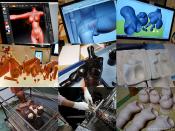Although cloning comes with many potential benefits, it will not produce a Utopia. Cloning has the potential to provide such developments as curing major diseases and treatment for infertility, yet opposing this are the many ethical issues surrounding cloning. In all, cloning will not be able to bring about a Utopian world.
Some of the benefits that the U.S. Department of Energy (who coordinate the U.S. Human Genome Project) declare are such things as curing major diseases, enabling scientists to regenerate organs for organ transplant, and even keeping endangered species from becoming extinct. Cloning also has the possibility of creating successful treatment for infertility. The steps that scientist would use to potentially cure some of the major diseases such as aids and hepatitis are as follows: 1. Determining which cells in the infected body have the disease. 2. Cloning the same cells of a healthy body. 3. Inserting those healthy cells into the body with the disease.
4. Watching the new cells adapt to the new body, and hopefully then watching the person get better! The same is with organ transplanting. If a person has an organ that isn't functioning right, or if they are missing one, scientists believe that through cloning techniques they will be able to grow organs and then transplant these organs into an awaiting body. Other benefits that cloning might provide are not as realistic as those mentioned above, but still have potential of happening. Some of these futuristic ideas include the possibility of cloning bodies such as Hitler or Stalin, or even bringing the Jurassic Park idea into reality. In saying this, these might not be as far away as some would hope to believe. Because one must remember that man once thought the world was flat. Man also believed that if a human was...


